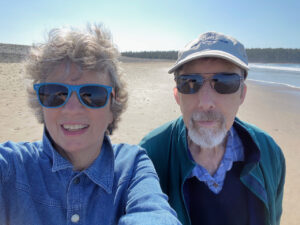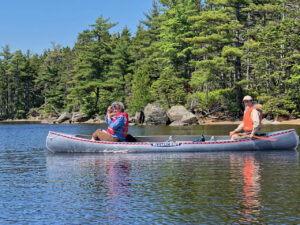Charlene Morton and Daniel Vokey: An Interconnected System
01 Oct 2024
For Daniel Vokey and Charlene Morton, their motivation to contribute to the Nature Trust initiatives reflects how they’ve come to understand the natural environment as a deeply interconnected system affecting all parts of their lives.
Charlene grew up with family walks and forest exploration in the regular rhythm of her childhood. Daniel recalls that the highlight of every summer was “going to a hunting and fishing camp with my family, being out on my own in the woods.” “We both grew up at a time where Rachel Carson came online,” explains Daniel, adding that “Many people have made the point that our well-being is very much tied together.” The work of early environmentalists such as John Muir and Aldo Leopold, as well as modern-day leaders and activists including David Orr and Vandana Shiva, helped shape both his and Charlene’s perspective on the interconnection of the environment, food security, education, and much more.
 They carried this appreciation of the natural world into their professional lives as educators. Charlene was particularly interested in trying to bring environmental education out of its isolated silo and integrate it across the curriculum. “Even though we’re all part of nature,” says Charlene, “the curriculum is still very relegated to its own parochial view of its academic interests. So it’s very hard – you have an opportunity there to talk about being vested in the resources around you, but every subject area is out for itself.” She contrasts this with what she discovered while working at UBC, where she and Daniel were both impressed by the way in which Indigenous scholarship – including the First Nations’ library cataloguing system – was deeply rooted in the context of the land and a sense of place.
They carried this appreciation of the natural world into their professional lives as educators. Charlene was particularly interested in trying to bring environmental education out of its isolated silo and integrate it across the curriculum. “Even though we’re all part of nature,” says Charlene, “the curriculum is still very relegated to its own parochial view of its academic interests. So it’s very hard – you have an opportunity there to talk about being vested in the resources around you, but every subject area is out for itself.” She contrasts this with what she discovered while working at UBC, where she and Daniel were both impressed by the way in which Indigenous scholarship – including the First Nations’ library cataloguing system – was deeply rooted in the context of the land and a sense of place.
Daniel worked as an instructor for outdoor adventure-based experiential education programs, including Outward Bound, where he helped instill a sense of responsibility and care for the environment in his expeditions’ participants. “At a minimum, we covered travelling responsibly in the wilderness, and at our best we promoted a conservation ethic.”
While he recalls being “very moved” by the breathtaking landscapes of places in the Yukon and Northwest Territories, he was also struck that “almost no place I’ve been was completely untouched by the scars of resource extraction or exploitation.” It’s easy to think that Canada’s vast size protects much of it from human disruption, but, as Daniel says, “We can’t take it for granted – if you fly over, you see where lines have been cut” even in remote places. “It’s a kind of constant wake-up call.”
Charlene adds that places she remembers exploring as a child in Nova Scotia may still look deeply forested in satellite and other aerial imagery, “but walking under all those trees you see the loss of habitat. Because we can’t take natural spaces for granted, we have to promote conservation.”
They looked for places to share their enthusiasm for conservation with like-minded supporters and found that they genuinely enjoyed fundraising events. “We liked the auctions, and we donated money to good causes,” Charlene says. At some point, they heard about the Nature Trust’s annual fundraising dinner, and their support took off as they learned more about the Nature Trust’s work and staff team. They especially appreciated the organization’s firm basis in science, and they had increasing confidence that their donations were being leveraged well.
Their support has grown over the years, and both Charlene and Daniel have chosen to include the Nature Trust as a beneficiary in their Wills. In addition, they made a substantial donation to the Twice the Wild campaign. After going through a complicated process of trying to help a friend purchase land in order to protect it, Charlene thought, “Why not just take the money you planned to use for a real estate deal and give it to an organization that is already studying land for its ecological significance? The Nature Trust has already done all the research, and it saves me a lot of work!”
 They also support the Nature Trust as volunteers, both as Property Guardians and more recently as “Nature Trust ambassadors” at community events. This past summer, they represented the Nature Trust at the Lunenburg County Lifestyle Centre’s “Community Connections Day” and at a Labour Day event in Liverpool. Charlene notes that, besides providing an opportunity to become more familiar with the broader scope of the Nature Trust’s work and invite others to learn more at public events like these, volunteering as an ambassador is also a great way to get friends more engaged. “If you have a friend you know is interested, ask them to come along and sit with you while you’re doing this ambassador stuff! It’s a good way to get people involved.”
They also support the Nature Trust as volunteers, both as Property Guardians and more recently as “Nature Trust ambassadors” at community events. This past summer, they represented the Nature Trust at the Lunenburg County Lifestyle Centre’s “Community Connections Day” and at a Labour Day event in Liverpool. Charlene notes that, besides providing an opportunity to become more familiar with the broader scope of the Nature Trust’s work and invite others to learn more at public events like these, volunteering as an ambassador is also a great way to get friends more engaged. “If you have a friend you know is interested, ask them to come along and sit with you while you’re doing this ambassador stuff! It’s a good way to get people involved.”
“One thing that’s impressed me about the South Shore is the volunteer ethic,” Daniel continues. He describes it as an “intact community,” and says that “it’s not that far off from an ecological ecosystem perspective – healthy community, healthy land, and people who are thinking outside of just their own situation.”
We’re grateful for Charlene and Daniel’s long term care for nature and for their thoughtful and generous support of the Nature Trust.
There are many ways to create a natural legacy with the Nature Trust, including a gift in your Will. Learn more!
